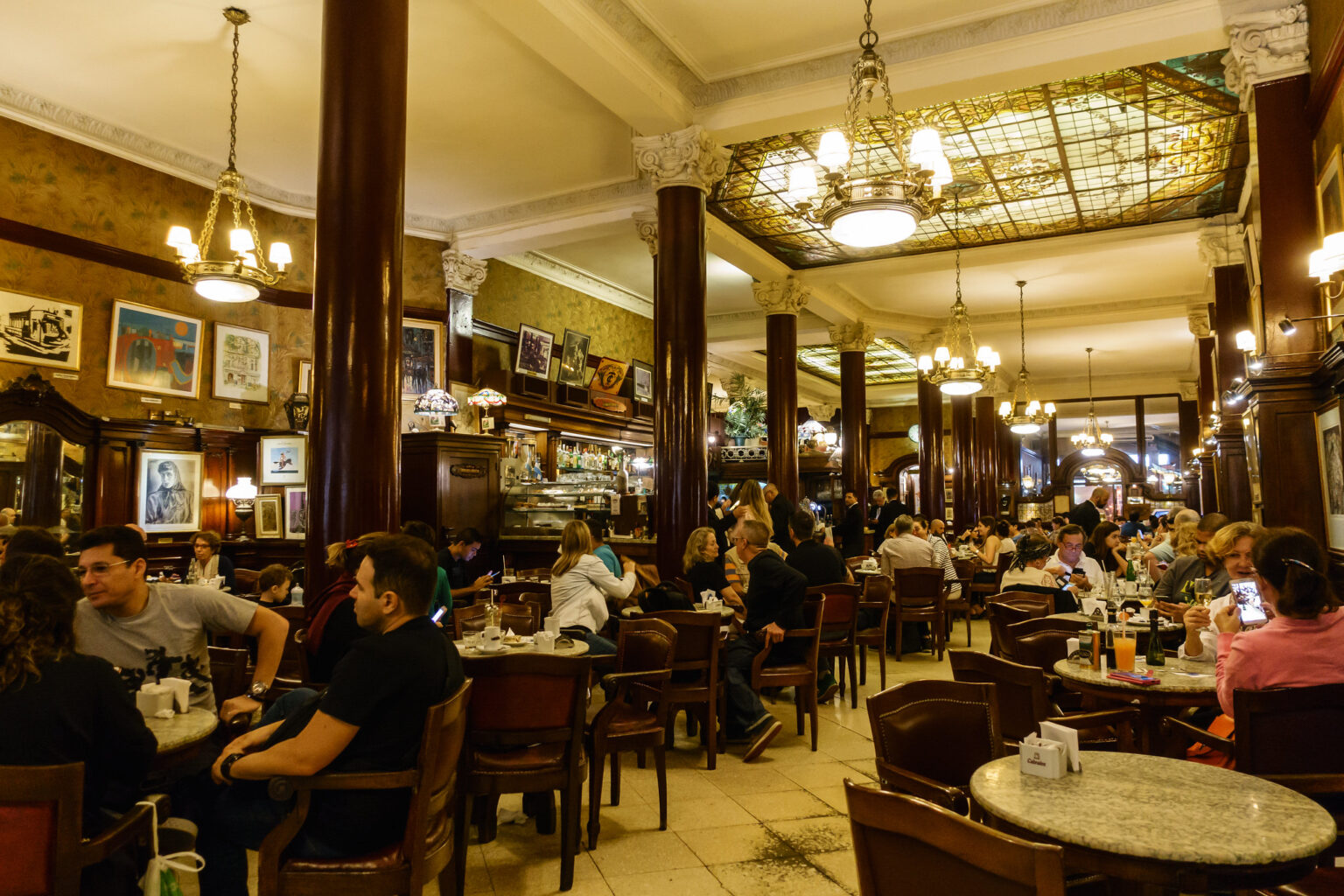Have you ever wondered where the heartbeat of Buenos Aires’ culture and history can be best experienced?
Whether you’re a digital nomad searching for your next remote office, a traveler eager to soak in the city’s ambiance, or an expat longing to uncover local secrets, “Notable Cafes and Bars in Buenos Aires: The Definitive Guide,” published by ExpatPathways, is your essential companion.
Buenos Aires, a city where every street corner tells a story, is home to some of the most iconic cafes and bars in the world. These establishments are not just places to grab a drink or a bite; they are living museums, offering a window into the soul of Porteño life, where history, art, and the passion for football converge.
First of all, what is a notable cafe or bar in Buenos Aires?
Notable bars are cafes and bars in the City of Buenos Aires recognized for their history. All of them have received renowned intellectuals, artists and figures of Argentine and Buenos Aires culture at their tables and chairs.
In the notable bars of Buenos Aires you will find designs that will make you feel like you are in an old café from Spain, France or Italy. Their designs remain as they were in their origins and their waiters usually have the forms and customs of the cafe waiters of yesteryear.
Visiting a notable cafe in Buenos Aires is not just an opportunity to enjoy breakfast or even a meal. Rather, it is a journey through the history of Buenos Aires, since many of these bars have witnessed the growth and development of the City.
The notable cafes and bars in Buenos Aires
1. Café Tortoni
Location: Av. de Mayo 825, Monserrat.
Café Tortoni, located in the Monserrat neighborhood, is a cherished historical gem of Buenos Aires. Founded in 1858 by French immigrant Touan, it stands as the city’s oldest café, designed by architect Alejandro Christophersen in 1898.
The café has hosted an array of iconic figures, including Jorge Luis Borges, Federico García Lorca, and Carlos Gardel, making it a significant cultural rendezvous point. Its marble tables, elegant façade, and rich interior tell stories of Buenos Aires’ splendid past.
Beyond its historical allure, Café Tortoni offers a cozy atmosphere that harkens back to the city’s golden age, complemented by exquisite pastries and a vibrant program of jazz and tango performances in its basement.
The café’s blend of magic, history, and culinary delights, alongside its status as a meeting place for notable personalities, cements its position as a must-visit destination in Buenos Aires.
2. Café de los Angelitos
Location: Av. Rivadavia 2100, Balvanera.
Located in the Balvanera neighborhood, Café de los Angelitos carries a storied history since its establishment in 1890 by Italian Batista Fazio. Initially a hangout for the city’s malandras and caferatas, it evolved into a beloved café frequented by luminaries such as José Ingenieros and Carlos Gardel, who signed his first record deal here in 1917.
After closing in 1993, it was reborn in 2007 with a sophisticated decor that pays homage to its rich past, featuring dark wood, stained glass, and a collection of 350 historical photos.
Today, Café de los Angelitos not only preserves the aesthetic and mystique of yesteryear but also serves as a vibrant venue for top-tier tango shows, making it a priceless cultural treasure.
Visitors can enjoy generous portions of quality cuisine and an unforgettable night of dance and music, marking it as an essential experience for anyone exploring the cultural fabric of Buenos Aires.
3. Café Los Galgos
Location: Av. Callao 501, San Nicolás.
Nestled at the corner of Lavalle and Avenida Callao in the San Nicolás neighborhood, Café Los Galgos stands as a testament to Buenos Aires’ rich café culture.
Originally opened in 1930, this beloved establishment has seen minimal yet essential renovations over the years, preserving its original charm. It was founded by a Spanish immigrant and later acquired by José Ramos in 1948, who honored its legacy by maintaining its name.
Los Galgos is renowned for its attentive service and unique ambiance, marked by wooden chairs, elegant porcelain galgos (greyhounds), and a bronze swan-shaped tap, among other quaint decorations.
The café has been a favorite haunt for notable figures like Enrique Santos Discépolo, Julio De Caro, and President Arturo Frondizi, offering delicious sandwiches, wines, coffees, and the traditional vermouth.
With its artisanal croissants and rich history, Café Los Galgos invites patrons to step back in time and enjoy a slice of Buenos Aires’ cultural heritage.
4. El Banderín
Location: Guardia Vieja 3601, Almagro.
Tucked away in the Almagro neighborhood, El Banderín serves as both a historic café and a museum of football flags, housing a collection of over 500 banners from clubs worldwide.
Originating in the early 20th century and initially known as “El Asturiano Provisiones y Fiambrería,” it transformed into a full-fledged confitería as supermarkets began to dominate the neighborhood. The café’s collection began as a tribute to the beloved River Plate football club by its owner, Don Mario, and has since grown to encompass teams from across the globe.
Visitors are drawn to El Banderín not only for its unique décor but also for its hearty milanesas, delightful Fernet, and the engaging atmosphere filled with football memorabilia.
It’s a must-visit for anyone looking to immerse themselves in the nostalgic ambiance of Buenos Aires’ traditional neighborhoods, offering an unforgettable experience that combines the passion for football with culinary delight.
5. Café Margot
Location: Av. Boedo 857, Boedo.
Located in the Boedo neighborhood, Café Margot is a cornerstone of Buenos Aires’ café scene, housed in a traditional building erected by Genovese Lorenzo Berisso in the early 20th century.
Known for its warm atmosphere, marble counters, and exquisite gastronomy, Café Margot has hosted an array of luminaries over the years, from politicians like Juan Domingo Perón, who famously stopped by to taste the acclaimed pavita sandwich, to cultural icons and sports legends.
Distinguished by historical societies and recognized as a “Testimonio Vivo de la Memoria Ciudadana,” Café Margot offers a variety of dishes and drinks, including the legendary turkey sandwich, making it an indispensable spot for both locals and visitors.
Whether you’re in the mood for a classic vermouth served with siphon water or looking to indulge in buttery croissants, Café Margot promises an authentic and inviting experience that epitomizes the spirit of Boedo.
6. Bar El Federal
Location: Carlos Calvo 599, San Telmo.
Located in the historic heart of San Telmo, Bar El Federal stands as a testament to Buenos Aires’ rich cultural tapestry, dating back to the 19th century.
Initially serving as a general store and beverage outlet, it has transformed into a beloved café-bar, maintaining its original charm with traditional furnishings and an array of memorabilia that includes vintage advertisements, photographs from the 1920s and 1930s, and unique objects that stir nostalgia.
Patrons are treated to a cozy ambiance, enhanced by attentive service and a menu filled with house specialties such as picadas, tortillas, lomos, and homemade ravioli.
The presence of esteemed figures like Enrique Santos Discépolo and Arturo Frondizi among its past customers underscores its significance as a classic Buenos Aires establishment, offering cold beers, tasty wines, and an environment filled with history and warmth.
7. Café Paulin
Location: Sarmiento 635, Microcentro.
Since 1988, Café Paulin has been celebrated as the home of “the best sandwiches in Buenos Aires.” Nestled in the bustling Microcentro, it’s a popular lunch spot for local office workers, originally starting as a café and maintaining its bar ambiance with wooden walls and tables.
Founded by Don Fermín from Galicia, who ran it until 2013, Café Paulin’s claim to fame is its gigantic sandwiches, affectionately known as “voladores” due to the waiters’ tradition of sliding the plated orders across the counter.
These sandwiches have been a staple among city workers for over three decades, with the café’s renown even reaching the silver screen in the Oscar-nominated film Argentina, 1985.
Today, Café Paulin continues to draw in patrons eager to experience its culinary legacy and enjoy a performance of food preparation that’s a spectacle in itself.
8. Las Violetas
Location: Av. Rivadavia 3899, Almagro.
Voted the most beloved Notable Café by the residents of Buenos Aires, Las Violetas was inaugurated in 1884 and quickly became a jewel of Almagro, sparing no expense in its construction.
The café’s elegance is evident in its fine woodwork, magnificent stained glass, Italian marble, and Parisian furniture. Frequented by luminaries such as Alfonsina Storni, Roberto Arlt, and Irineo Leguisamo, it briefly closed in 1998 but was later declared a historical protection area and reopened in 2001, preserving its charm and splendor.
Las Violetas is famed for its generous and delicious afternoon teas, characterized by Carrara marble pieces, original bronze chandeliers, and a menu that ranges from exquisite pastries to hearty meals.
Whether opting for its traditional confectionery, a lunch dish, or the much-loved chocolate with churros and tea service, Las Violetas offers an unparalleled experience of abundance and quality, wrapped in 140 years of history.
9. La Biela
Location: Av. Pres. Manuel Quintana 596, Recoleta.
Nestled in the picturesque corner of Junín and Av. Quintana in Recoleta, just a stone’s throw away from the Iglesia del Pilar and the Cemetery, La Biela is a notable bar steeped in Argentine culture and history.
Originally starting as “La Viridita” with only 18 tables on a narrow sidewalk, it underwent several name changes and transformations, reflecting the neighborhood’s vibrant life, including its homage to civil pilots as “Aerobar” and eventually adopting the name “La Biela” after a group of racing enthusiasts’ car broke down at the very spot.
La Biela became an emblematic meeting point for intellectuals like Jorge Luis Borges, Adolfo Bioy Casares, and international sports figures.
Today, visitors can enjoy the ambiance of this historic café, where the presence of Borges and Bioy Casares is immortalized in life-sized statues by sculptor Fernando Pugliese, making it a favorite spot for both locals and tourists alike, renowned for its exceptional service and atmosphere that perfectly encapsulates the essence of Buenos Aires.
10. Bar de Cao
Location: Av. Independencia 2400, San Cristóbal.
Starting as a joint venture by the Cao brothers, José and Vicente, Bar de Cao has long stood as a testament to the rich café culture in the San Cristóbal neighborhood of Buenos Aires.
After a period of closure, it was revitalized and reopened its doors in 2005, continuing its legacy as an almacén and beverage dispensary that beautifully melds the warmth of a family home with the aesthetic of a traditional bar.
Recognized as a Notable Café by the City’s Ministry of Culture and declared a Site of Cultural Interest, Bar de Cao captivates visitors with its picturesque charm, excellent service, and delicious offerings, from homemade bread to local specialties.
A true gem in San Cristóbal, Bar de Cao stands out as one of the most beautiful and authentic bars in the area, where guests can savor the flavors of Argentina in a setting that’s both inviting and steeped in history.
(Featured Image Source: my_cottage/flickr.com)


